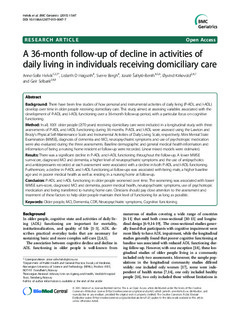A 36-month follow-up of decline in activities of daily living in individuals receiving domiciliary care
Helvik, Anne-Sofie; Høgset, Lisbeth Dyrendal; Bergh, Sverre; Saltyte Benth, Jurate; Kirkevold, Øyvind; Selbæk, Geir
Journal article, Peer reviewed
Published version

Åpne
Permanent lenke
http://hdl.handle.net/11250/2628172Utgivelsesdato
2015Metadata
Vis full innførselSamlinger
Sammendrag
Background There have been few studies of how personal and instrumental activities of daily living (P-ADL and I-ADL) develop over time in older people receiving domiciliary care. This study aimed at assessing variables associated with the development of P-ADL and I-ADL functioning over a 36-month follow-up period, with a particular focus on cognitive functioning. Method In all, 1001 older people (≥70 years) receiving domiciliary care were included in a longitudinal study with three assessments of P-ADL and I-ADL functioning during 36 months. P-ADL and I-ADL were assessed using the Lawton and Brody’s Physical Self-Maintenance Scale and Instrumental Activities of Daily Living Scale, respectively. Mini Mental State Examination (MMSE), diagnosis of dementia and MCI, neuropsychiatric symptoms and use of psychotropic medication were also evaluated during the three assessments. Baseline demographic and general medical health information and information of being a nursing home resident at follow-up were recorded. Linear mixed models were estimated. Results There was a significant decline in P-ADL and I-ADL functioning throughout the follow-up. A lower MMSE sum-score, diagnosed MCI and dementia, a higher level of neuropsychiatric symptoms and the use of antipsychotics and antidepressants recorded at each assessment were associated with a decline in both P-ADL and I-ADL functioning. Furthermore, a decline in P-ADL and I-ADL functioning at follow-ups was associated with being male, a higher baseline age and in poorer medical health as well as residing in a nursing home. Conclusion P-ADL and I-ADL functioning in older people worsened over time. The worsening was associated with lower MMSE sum-score, diagnosed MCI and dementia, poorer medical health, neuropsychiatric symptoms, use of psychotropic medication and being transferred to nursing home care. Clinicians should pay close attention to the assessment and treatment of these factors to help older people maintain their level of functioning for as long as possible. A 36-month follow-up of decline in activities of daily living in individuals receiving domiciliary care
